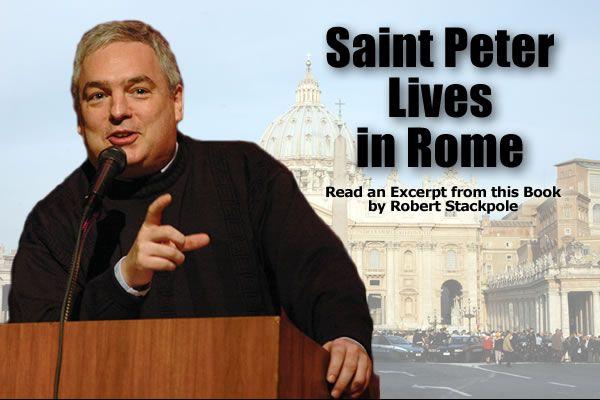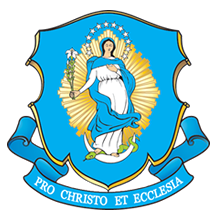
The following is the introduction to the book Saint Peter Lives in Rome, by Dr. Robert Stackpole, STD, who will discuss the book on EWTN on Monday, July 7, at 8 p.m. EST. Dr. Stackpole, who writes the popular Q&A column on this website, is the director of the John Paul II Institute of Divine Mercy, a lay apostolate of the Marians of the Immaculate Conception.
By Dr. Robert Stackpole, STD
This book addresses the most contentious issue in Christian ecumenical dialogue: the role of the papacy in Christ's holy Church. As a matter of fact, I was once something of an ecumenical wanderer myself. Born the son of a Protestant pastor, I became an Anglican as an undergraduate, and later pursued a vocation to the Anglican priesthood. I will always be sincerely grateful for all that I learned about God and His love, and about His Son Jesus Christ, through the years of my Protestant upbringing and Anglican formation.
Nevertheless, I always felt that something important was missing from what had been given to me. Several times, I almost became a Catholic - a sign of my inner restlessness - but then drew back. The distinctive Roman Catholic doctrines about Mary, the saints, purgatory, and the Eucharist were never the most serious stumbling blocks. After all, I could accept those doctrines and remain a "High" Anglican, or even become Eastern Orthodox. It was the doctrine of the papacy, the Petrine Ministry, which really stood in the way.
After much prayer and study, I found it no longer stood in the way. This book explains why.
I know from the outset that many readers will be disappointed by what I have to say. I would guess that what many would want me to write, what they would hope I would write, is that from a Catholic perspective, there is an ever increasing possibility for ecumenical reconciliation among the Christian churches regarding the proper role of the papacy.
Sadly, I do not believe that to be the case. To be sure, we are much closer together on this issue than we were a century ago. One can certainly try to clarify the dogmatic foundations of the papacy in Scripture, Tradition and Reason. All this I will try to do, from a Catholic perspective, in the chapters that follow.
In the end, however, I believe sincere Christians are still faced with a choice. This is not one of those issues that can be dismissed as a mere ecumenical misunderstanding or semantic disagreement. Nor can it be relegated to the area of dogmatic inessentials. As the whole history of the Church shows, the unity of the Body of Christ, and the means our Lord has given to us to secure that unity in truth and love, are vital and essential to the whole mission of the Church. Christian unity is not an "optional-extra" to the Church's mission; rather, it is the supreme manifestation of the grace of Christ in the world, without which the task of evangelism is largely crippled. Jesus Himself taught us this in St. John's gospel, chapters 10 and 17:
And I have other sheep, that are not of this fold; I must bring them also, and they will heed my voice. So there shall be one flock, one shepherd (10:16).
I do not pray for these only, but also for those who believe in me through their word, that they all may be one; even as thou, Father, art in me, and I in thee, that they also may be one in us, so that the world may believe that thou hast sent me (17:20-23).
Commenting on these passages, the Catholic apologist Stephen Ray has pointed out:
A sheepfold provides a distinct enclosure whereby the sheep are protected, kept together, and fed. ... Jesus never meant the Church to be rent by divisions, torn asunder into competing denominations and sects. He prayed that the Church, His flock, would be one and perfected in unity. This cannot be relegated to an "invisible" unity, for only a visible and organic unity can be seen and observed by the world ["that they may all be one ... so that the world may believe ..."]
I trust that all Christians, whatever church body we may belong to, believe in Jesus Christ as Lord and Saviour. All of us want to accept everything that God has revealed to us through Him, and want to follow Him with faith and love. This is our great and inspired "common ground," and thanks be to God that in our ecumenical age we finally recognize that fact, and can pray together, and cooperate in many areas, more than ever before.
Again, all of us want to accept Jesus Christ as our Lord and Saviour, to believe what He reveals, and to follow wherever He leads. But I have become ever more convinced that to do so fully, completely and unreservedly, means to do so in communion with, and in obedience to, His Vicar on earth, in the See of St. Peter.
This is not "triumphalism"; in fact, the sixteenth century theologian who helped clarify this aspect of Catholic teaching, St. Robert Bellarmine, was himself one of the early advocates for true religious tolerance. What we are up against here is not "triumphalism," but a definitive conviction: a conviction that has always, implicitly or explicitly, defined and distinguished the great Catholic Church throughout the world. You may come to hold this conviction someday, or you may not. Whatever you and I decide, of course, must always be done with prayer and charity, as Christ Jesus bids us to do in all things. My task in these chapters is to present to you, as clearly as I can, the teaching of the Catholic Church regarding the papal ministry, to help you make an informed and prayerful choice. Certainly I hope and pray that your choice will not be based on my presentation alone - and I doubt, in any case that it would. My task is but to clear away misunderstandings, to clarify foundations, and to explain as best I can, why Catholics hold this "definitive conviction."
Order a copy of Saint Peter Lives in Rome.
















